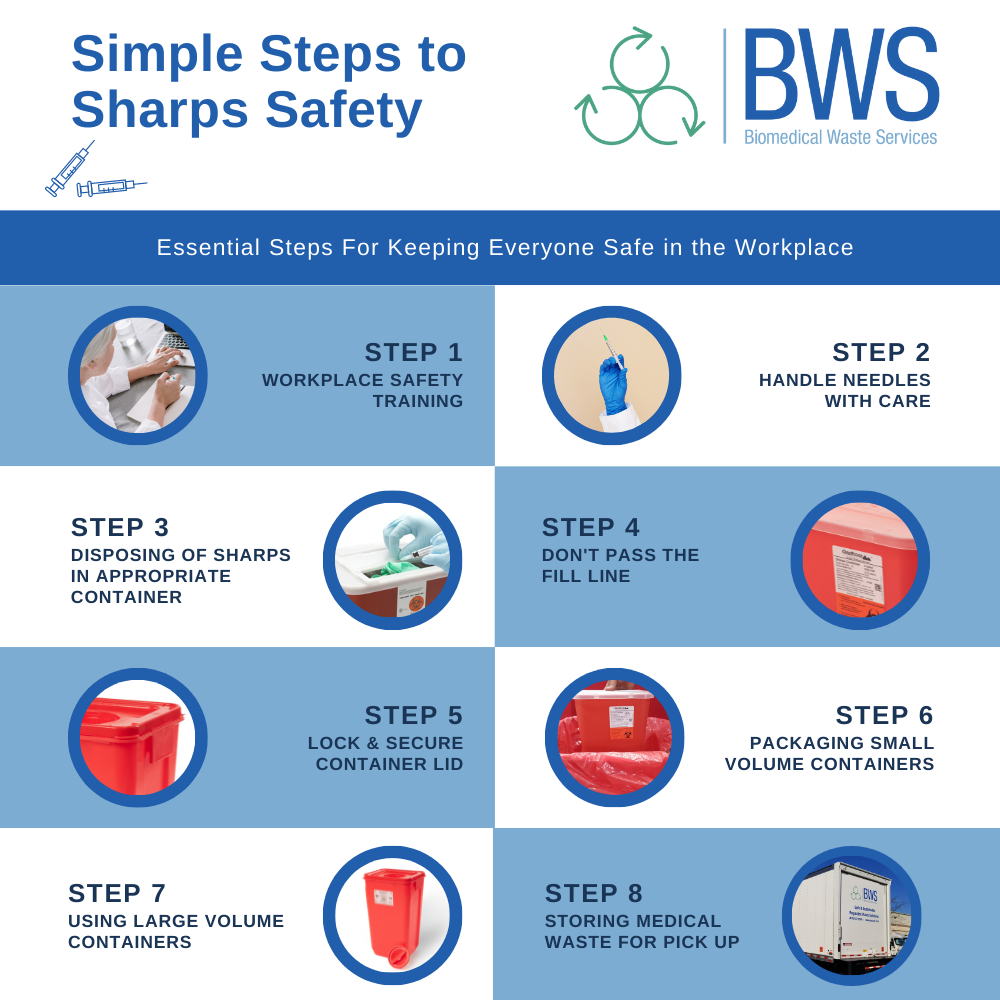Baltimore's Leading Secure Document Shredding Partner with Next-Day Service & Flexible Options – No Contracts, No Hidden Fees - Schedule Now
Resources:
Articles, Insights, and Updates
Simple Steps to Sharps Safety
Handling sharps within the workplace is serious and requires many safety measures in place to protect staff, patients or customers, and anyone handling the biohazardous waste. Having guidelines in place for sharps management helps reduce the risk of injury, spreading potentially infectious diseases, and avoid hefty fines for mismanaged sharps. It's always important to remember that the waste generator is responsible for their waste until final disposal. Not properly handling sharps waste and improper packaging puts people at risk, even after it's been picked up and being transported for disposal.
Essential Steps for Keeping Everyone Safe in the Workplace
Following the steps outlined below will help prevent potential injuries, dangerous exposures, and OSHA compliance fines.
Step 1 - Workplace Safety Training
Workplace safety training is an important step to sharps management safety. For the employer or practice manager, ensure all staff and employees are up-to-date and current on their workplace safety training and procedures. This requires an assessment of all staffs' roles and responsibilities to determine their training needs. Generally, the annual trainings required by OSHA in healthcare settings are Bloodborne Pathogens, HAZCOM, and HIPAA. However, depending on the staff member's role, other trainings may be required.
Exposure plans and prevention procedures are important to have outlined and communicated to all employees as well. This will help anyone that is potentially exposed or injured by needles know exactly what to do and what actions to take in the event this occurs. Performing a safety audit may help identify any deficiencies and action plans to improve safer work practices.
Step 2 - Handle Needles with Care
Needles and other sharps are dangerous. When not handled properly, the risk of injury increases. Always use precautions and follow local, state, and federal guidelines when handling needles and other sharp objects. Safety tips such as knowing where the nearest sharps container is, not uncovering or unwrapping the sharp object until its needed, or keeping your fingers away from the tip of the sharps are just a few simple steps to keep you and those around you safe while handling needles.
Even after needles or sharps are in designated sharps containers, handle the sharps container with care as well. Sudden movements or jolts may dislodge sharps if the container isn't properly secured.
Step 3 - Disposing of Sharps in Appropriate Container
Sharps containers are generally red in color with a biohazard symbol and widely known in the healthcare industry as a container to discard needles and other sharp objects. These are designated containers that are puncture-proof and safe for disposing of loose sharps. Loose needles should never be placed directly into the biohazard box/container without being deposited into the disposable sharps container first. It's also important to make sure your facility is adequately stocked with sharps containers and that staff members know where they're located and stored. This may require assessing your needs based on needle type or size so that your sharps containers are large enough for your entire sharps device.
Step 4 - Don't Pass the Fill Line
Most sharps containers have a label on the exterior with a designated fill line. Follow the instructions on the respective labelling and fill line of the sharps container to avoid overfilling the container. This allows the container to properly close and keep the contents secure. Overfilling can cause sharps and other contents of the container to become loose, even after placed in the biohazard box/red bag for disposal. Once loose in the box, the needles or sharp objects can puncture the biohazard box putting anyone handling the waste at risk.
You should visibly inspect the sharps container for anything protruding. If it appears the waste is overflowing, follow CDC guidelines for removing any overflowing contents. Never put your hand in the sharps container or use your hand to push the waste down.
Step 5 - Lock and Secure Container Lid
All FDA approved sharps containers are made with a locking mechanism to secure the contents of the container once full. The locking systems make it safer and easier to handle full sharps containers. It also ensures the contents of the container won't come loose. Generally once locked, the safety feature can not be reactivated or opened. As along as the container is not filled pass the fill line, sharps containers should easily lock for final disposal.
Step 6 - Packaging Small Volume Containers
One of the most common needlestick injuries is from improper packaging. Packaging your full, locked and secured sharps containers is just as important to prevention measures while the containers are in use. As a reminder, you, the generator are still responsible for your waste until it is properly treated and disposed of. How you package the sharps containers can impact the safety of others. Small volume sharps containers should be placed in the RMW (regulated medical waste) box or container that is lined with a red bag, which is acceptable and DOT approved for disposable sharps containers. Using the 28 gallon reusable RMW containers provides an additional layer of durability and safety for transport should sharps become loose from their designated container.
Step 7 - Large Volume Containers
Your facility may generate a large volume of sharps waste so you're using 8 gallon or 18 gallon high volume sharps containers. Both sizes are DOT regulated and approved for transport without additional packaging. Loose sharps can be placed directly into either of these large volume, puncture-proof containers for safe disposal. To learn more about large volume sharps containers, acceptable waste types, and the benefits of using them, check out our Large Volume Sharps Container Resource Guide.
Step 8 - Storing Medical Waste for Pick up
Your sharps containers have been handled with care and properly packaged. Now what? First, be sure to store your packaged waste in a designated area within your facility and not accessible to patients. It is suggested to promptly dispose of your sharps and biohazard waste. With service at Biomedical Waste Services, your waste will be picked up and safely transported for disposal at our processing facility during your next scheduled pick up or when you call in to request a pick up.
Partnering with BWS to Manage Your Workplace Sharps Safety
Here at Biomedical Waste Services, Inc. (BWS) we have over 45 years of experience collecting, transporting, and disposing of sharps and biohazardous or infectious waste and managing workplace compliance solutions for a variety of industries in the mid-Atlantic areas, including Maryland, Virginia, Washington D.C., Delaware, Pennsylvania, and West Virginia. We've partnered with many healthcare facilities and other industry organizations to manage sharps safety and keep their workplaces compliant to avoid injuries and large fines. We offer OSHA compliance safety training and help take the guess work out of managing sharps waste safely. Our sharps container products are top-rated and available for drop off with any pick up. Call or contact us today to see how we can help your facility manage your sharps waste disposal and OSHA compliance training needs.
NOTE: The steps outlined in this article are suggestions or recommendations and NOT intended to replace local, state, or federal agency guidelines. Always follow standard guidelines set forth by the CDC, OSHA, and other trusted agencies.
References:
Sharps Safety for Healthcare Settings
Related Industries:
Ready to get started?
We offer a variety of competitively priced service options with no contracts or hidden fees. Request a free quote.
Our Dedication to Providing the Highest Quality Regulated Waste Services
is Shown in What Our Clients Say About Our Work
We provide an outstanding value and service to our regulated waste customers and pride ourselves over the last 50 years on our 100% customer satisfaction with 99% customer retention ratio.
Paul R Miller, D.D.S. and Team
ZytoGen Patient Services
Akbar Masood, D.D.S.
Chris Donaldson
Dharani Jasthi
Tomicka Jackson-George, D.M.D.
Louis Sachs, D.D.S.
Kate Blair English
Dave Ryan
Kerry Owens, Avalon Plastic Surgery
Jamie Fleming, National Spine & Pain Centers
Keith Roberts, Biomatrix Specialty Pharmacy
Mireia Pedragosa Marin, Synergy Research
Rebecca Crouse, Randolph Macon Academy
Melissa C, Patriot Chiropractic
Dr. Rosario Ignacio
Dr. Thomas Lutz, Odenton Family Dentistry
Dr. Louis Sachs, DDS
Eric B.
Brenda Shah
Stay connected - Be the first to know!
Get BWS news and promotions straight to your inbox
Don't worry. We won't sell your information!





